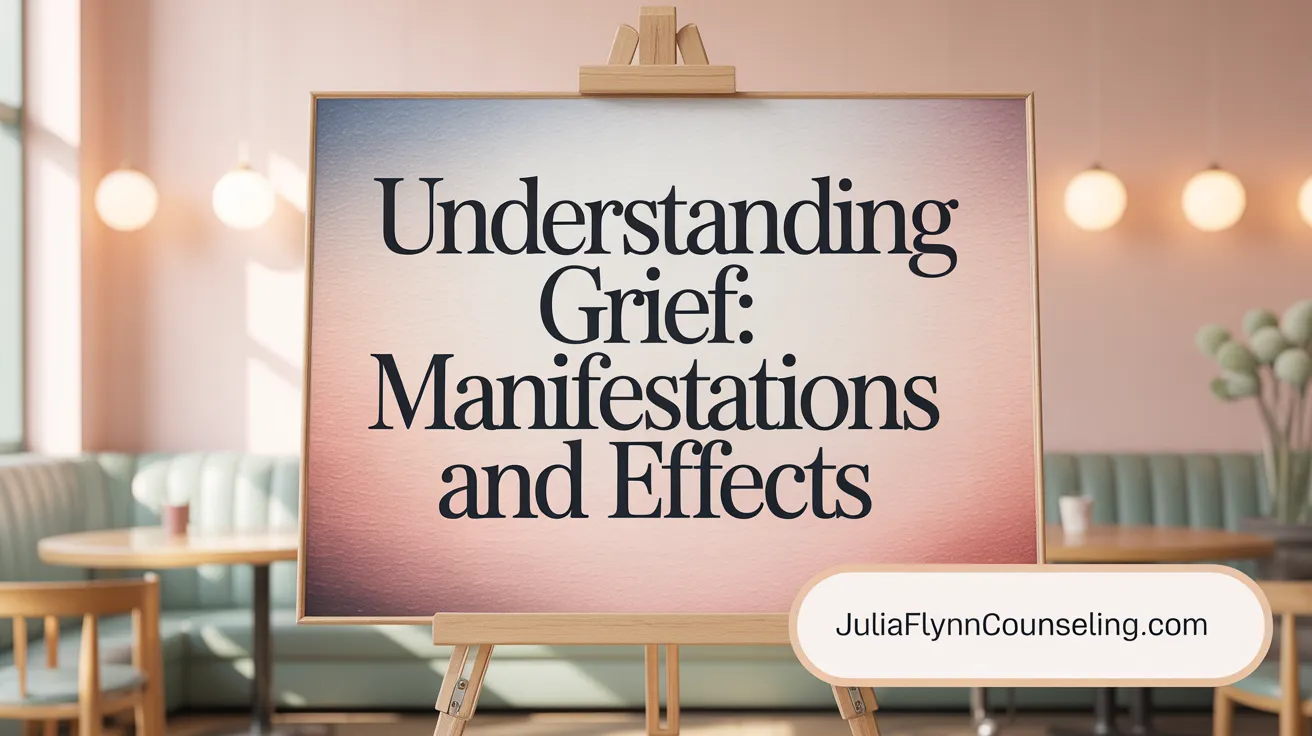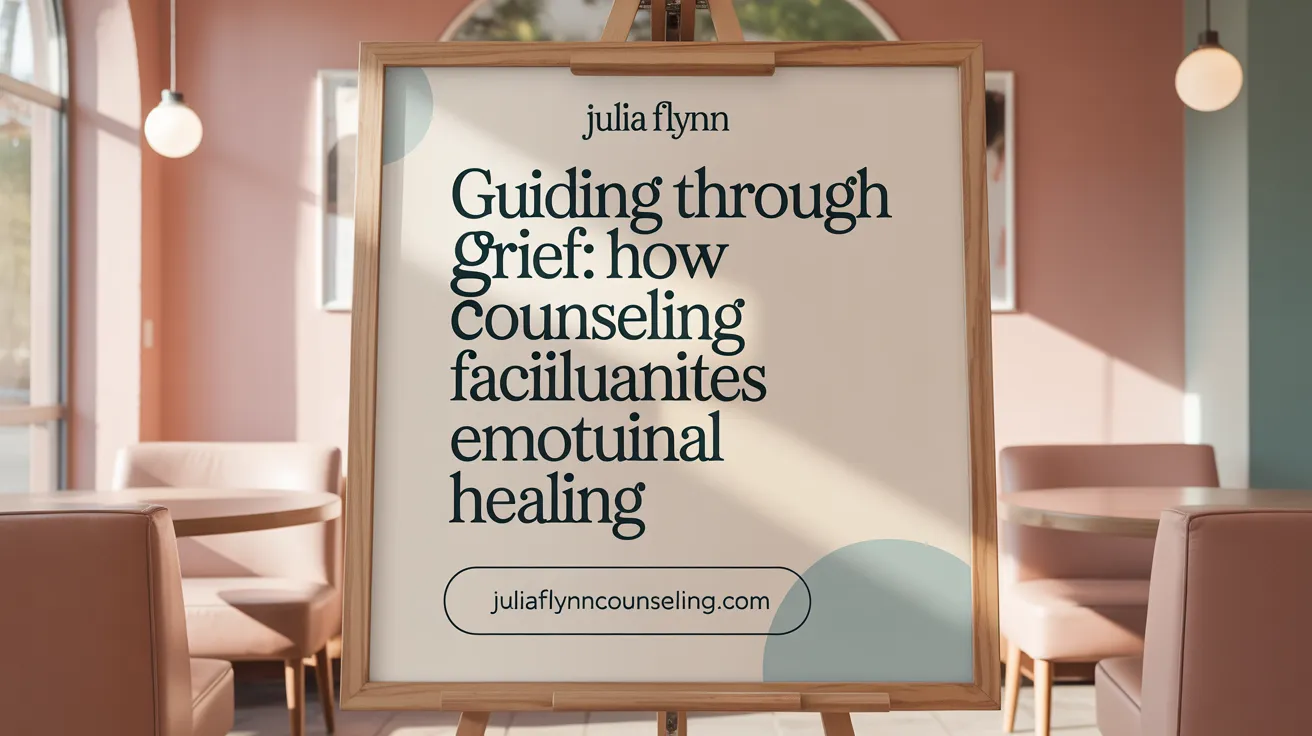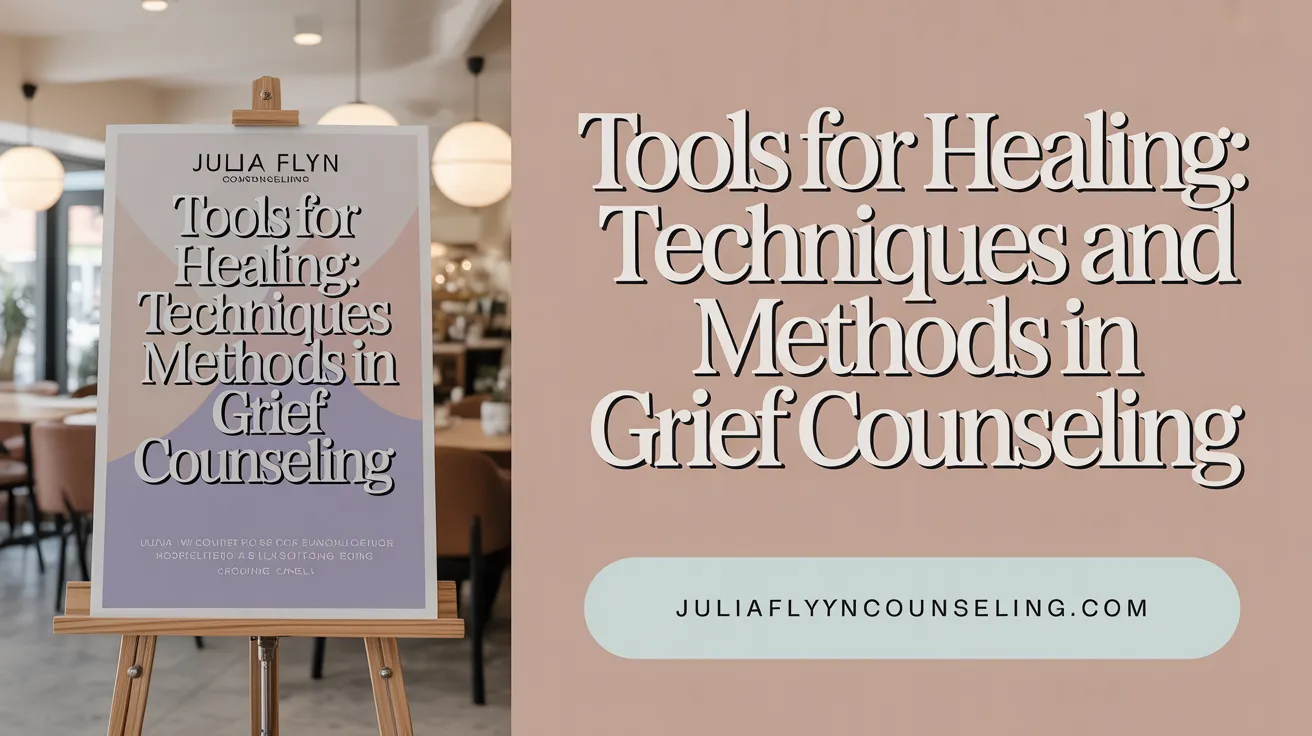Embracing Grief for Healing and Growth
Grief is a profound, multifaceted emotional response to loss that touches every aspect of our being—emotional, physical, cognitive, social, and spiritual. While deeply personal and often isolating, grief also ties closely to our capacity for love and connection. Grief counseling emerges as a vital support, providing a safe and empathetic space to navigate this complex journey. This article explores the healing power of grief counseling, unpacking how it works, the techniques involved, and its pivotal role in fostering resilience, understanding, and emotional restoration.
What Is Grief and How Does It Manifest?

What is grief and how does it manifest?
Grief is a natural, complex emotional response to loss, affecting nearly every aspect of a person’s life. It can arise from losing someone dear, experiencing the end of a relationship, or even touching on societal and cultural injustices. Grief manifests uniquely in each individual, influencing emotional, physical, cognitive, behavioral, social, and spiritual dimensions.
Emotionally, grief can produce feelings of profound sadness, anger, guilt, and fear. Physically, it often presents as fatigue, sleep disturbances, loss of appetite, headaches, and muscle weakness. Cognitive effects may include confusion, difficulty concentrating, and intrusive thoughts. Behaviorally, individuals might withdraw from social interactions, neglect self-care, or engage in activities aimed at managing their pain.
The stages of grief, popularized by Elisabeth Kübler-Ross, outline phases such as denial, anger, bargaining, depression, and acceptance. However, these are not experienced linearly; a person may move back and forth between them or skip stages altogether. Grief can also take different forms, including anticipatory grief before an impending loss, delayed grief where acknowledgment is postponed, or complicated grief—also called prolonged grief disorder—that persists beyond typical timeframes.
Cultural and personal differences significantly influence how grief is expressed. For some, rituals, community, and spiritual practices play crucial roles, while others may grieve privately. Recognizing that grief’s manifestations vary helps in providing compassionate support tailored to each individual’s experience. By understanding the diverse ways grief appears, loved ones, caregivers, and professionals can better assist those navigating this intense life journey.
The Healing Benefits of Grief Counseling

What are the healing benefits of grief counseling?
Grief counseling provides vital support that can significantly aid in emotional recovery after a loss. It offers a safe, empathetic environment where individuals can openly express their feelings, reducing the sense of loneliness that often accompanies grief. Validating emotions such as sadness, anger, guilt, and confusion helps clients process their pain more healthily.
A core benefit of grief therapy is the development of effective coping strategies. Techniques like mindfulness, journaling, and cognitive-behavioral methods empower individuals to manage intense emotions, regain a sense of control, and foster resilience. These tools assist in navigating the complex stages of grief, including acceptance and rebuilding life.
In addition, grief counseling fosters improvements in mental health. By addressing unresolved emotions and preventing prolonged grief disorder, therapy supports better mental well-being and reduces risks of depression, anxiety, or physical health decline. It encourages post-traumatic growth—allowing individuals to find meaning in their experience, strengthen relationships, and adapt to new life circumstances.
Furthermore, engaging in therapy can promote personal growth, helping individuals reevaluate life purpose and embrace new beginnings. This process often leads to enhanced self-awareness and emotional strength. The long-term effects include increased resilience not only in facing future challenges but also in maintaining overall health.
| Benefit Area | Description | Additional Notes |
|---|---|---|
| Emotional validation | Acknowledging and normalizing emotional responses | Reduces feelings of isolation |
| Coping strategies | Techniques like mindfulness, journaling, CBT | Builds resilience |
| Mental health | Decreases risk of depression, anxiety | Promotes overall well-being |
| Personal growth | Finding meaning after loss | Encourages self-discovery |
| Long-term health | Better handling of future stressors | Prevents physical and psychological issues |
Grief counseling is an essential tool facilitating long-lasting healing by addressing emotional, mental, and physical dimensions of loss. It validates personal experiences, offers coping resources, and supports ongoing resilience, making it a key component in navigating the grieving process effectively.
How Grief Counseling Works in the Healing Process

How does grief counseling work and what is its role in the healing process?
Grief counseling functions as a compassionate guide that offers a safe and supportive space for individuals to explore their feelings of loss. In such environments, clients are encouraged to openly express emotions like sadness, anger, guilt, or confusion without fear of judgment. Therapists use various techniques, including talk therapy, creative expressions like art, and cognitive exercises, tailored to each person’s unique needs.
A central aspect of grief counseling is helping individuals understand the natural stages of grief — such as denial, anger, bargaining, depression, and acceptance — and recognizing that everyone’s journey is different. Counselors work on normalizing these experiences, reducing feelings of isolation and shame.
Personalized treatment approaches are vital. Therapies like cognitive-behavioral therapy (CBT), mindfulness exercises, and storytelling help clients process their emotions constructively. These methods foster acceptance of the loss, help manage physical and emotional symptoms, and support the development of healthy coping strategies.
Counselors also assist in facilitating a connection to the deceased or a sense of ongoing bond, which can be crucial for healing. They guide clients toward acceptance, enabling the emotional adjustment necessary for resilience.
Ultimately, grief counseling plays a vital role in helping individuals move through the pain, find personal meaning, and rebuild their lives after loss. It promotes emotional healing, fosters resilience, and prepares individuals to face future challenges with greater strength and understanding.
The Grieving Process and Emotional Healing Through Counseling

What is the process of grieving and how does counseling facilitate emotional healing?
Grief is a deeply personal and complex emotional response to loss. It can involve a wide range of feelings, such as sadness, anger, guilt, and fear, and physical signs like fatigue, sleep disturbances, or headaches. The experience of grief varies greatly among individuals; some may go through the well-known stages of denial, anger, bargaining, depression, and acceptance, but these do not follow a strict sequence and can overlap or recur.
Participating in grief and bereavement counseling offers a supportive environment where individuals can safely express these intense emotions. Counselors help normalize the varied experiences of grief and provide tools to cope effectively. They may utilize various techniques like active listening, cognitive restructuring, imagery, or memorial creation to help clients process their pain and find meaningful ways to honor their loss.
Counseling also aids in helping individuals adjust to a new reality without their loved one, whether that involves rebuilding relationships, finding renewed purpose, or establishing new routines. Ultimately, therapy fosters resilience by supporting emotional regulation, encouraging self-awareness, and guiding clients toward acceptance.
Through these supportive interventions, people can better understand their grief, prevent prolonged distress, and gradually regain emotional balance. This process empowers individuals to weave their loss into their life story, helping them move forward with a sense of hope and renewed strength.
Techniques and Methods Used in Grief Counseling
 Grief counseling encompasses a variety of therapeutic techniques designed to help individuals process their loss and find pathways to healing. Among the most common methods are cognitive-behavioral therapy (CBT) and acceptance and commitment therapy (ACT).
Grief counseling encompasses a variety of therapeutic techniques designed to help individuals process their loss and find pathways to healing. Among the most common methods are cognitive-behavioral therapy (CBT) and acceptance and commitment therapy (ACT).
CBT focuses on helping clients recognize and challenge unhelpful or negative thought patterns that may hinder acceptance or prolong grief. It aims to reframe thoughts, fostering healthier perspectives and reducing emotional distress.
ACT, on the other hand, emphasizes mindfulness and acceptance of difficult emotions associated with loss. It encourages individuals to observe their feelings without judgment, facilitating a commitment to actions aligned with personal values despite pain.
Narrative therapy also plays a crucial role, where clients narrate their personal stories related to the loss. This process helps them understand and integrate their experiences, creating a coherent life story that includes the grief journey.
Expressive therapies such as art, writing, and role-play further support emotional expression. These approaches allow individuals to externalize their feelings, explore unresolved issues, and find new meaning through creative outlets.
Visualization techniques, imagery, and metaphors are often employed to help clients imagine healing or alternative perspectives, making abstract concepts more tangible. For example, imagining the pain as a physical object that can be gently released or transformed.
Ritual activities—such as commemorative ceremonies, drumming, or symbolic gestures—are incorporated to create coherence and foster a sense of community during mourning. These activities help individuals move through grief by honoring their loss within a supportive environment.
Furthermore, specialized therapies are available for more complex or prolonged grief reactions. EMDR (Eye Movement Desensitization and Reprocessing), for instance, is used to process traumatic memories linked to loss, reducing emotional distress and facilitating acceptance.
In summary, grief counseling utilizes a comprehensive toolkit of techniques—from cognitive restructuring and mindfulness to narrative and expressive therapies—to address the multifaceted nature of grief and promote resilience.
Benefits of Grief Counseling for Individuals and Families
What benefits does grief counseling offer to individuals and families?
Grief counseling provides numerous advantages for those navigating the difficult journey of loss. One of its primary benefits is creating a safe, non-judgmental space where individuals can openly express their emotions, including anger, sadness, or guilt, without fear of judgment. This supportive environment helps normalize grief, understanding that each person's feelings and timeline are valid.
Counseling also encourages emotional exploration, which can facilitate the process of expressing and understanding complex feelings. Techniques such as mindfulness and cognitive-behavioral strategies equip individuals with tools to manage distressing emotions, fostering resilience.
For families, grief counseling can improve communication by helping members share their feelings honestly and listen empathetically. This openness often strengthens relationships and boosts mutual support, which is vital during challenging times.
In addition, grief therapy promotes social connectedness, reducing feelings of loneliness and isolation. Support groups and family sessions foster a sense of belonging and shared understanding, which can be crucial for emotional recovery.
Although individual experiences vary and high-quality evidence continues to develop, research indicates that grief counseling facilitates emotional healing, helps prevent the development of mental health problems such as depression or anxiety, and encourages personal growth. Overall, it serves as a vital resource to help individuals and families adapt to loss and rebuild their lives.
| Benefit | Description | Additional Details |
|---|---|---|
| Supportive environment | Offers a safe space for emotional expression | Helps normalize grief reactions |
| Emotional validation | Validates diverse grief responses, reducing guilt and confusion | Encourages acceptance of feelings |
| Communication improvement | Facilitates honest dialogue and mutual understanding | Strengthens family bonds |
| Coping and resilience skills | Teaches practical strategies like mindfulness and cognitive tools | Enhances capacity to manage ongoing emotions |
| Social connectedness | Promotes support networks through group or family therapy | Reduces loneliness, fosters community support |
By providing these benefits, grief counseling supports not only emotional healing but also the development of a resilient outlook, helping individuals and families cope with future challenges related to loss.
The Importance of Grief Counseling in End-of-Life and Terminal Illness Contexts
Why is grief counseling important in end-of-life and terminal illness contexts?
Grief counseling plays a vital role for individuals facing terminal conditions and their families. It provides a safe space to process the complex emotions tied to impending loss, such as fear, sadness, guilt, and anger. This preparatory phase, known as anticipatory grief, allows both patients and caregivers to confront difficult feelings and resolve unfinished business.
Counseling helps mitigate anxiety and fosters acceptance, which can positively influence decision-making and overall wellbeing during a challenging time. It also guides individuals in addressing unresolved issues, facilitating emotional preparation before death occurs. Moreover, tailored therapeutic approaches—such as family sessions, individual therapy, and support groups—enhance resilience and foster personal growth.
Post-death, grief counseling continues to support the bereaved, assisting them in navigating their mourning journey, finding meaning, and developing coping strategies. This ongoing support can reduce risk of complicated or prolonged grief and improve long-term emotional health.
Ultimately, grief support in these contexts improves quality of life for patients and families alike, enabling them to face loss with acceptance, strength, and a sense of connection. It encourages healthier grieving processes, helping individuals adapt and thrive amidst profound loss.
| Aspect | Focus | Benefits |
|---|---|---|
| Anticipatory grief | Emotional preparation before death | Reduces anxiety, fosters acceptance, resolve issues |
| Support for caregivers | Handling their emotional burden | Prevents burnout, improves coping |
| Processing unresolved emotions | Addressing guilt, anger, fears | Enhances peace, readiness for loss |
| Post-death coping | Navigating grief after loss | Prevents prolonged grief, promotes healing |
| Improving quality of life | During illness and beyond | Increases resilience, emotional strength |
Supporting individuals through these stages helps them find dignity, peace, and resilience during one of life's most difficult transitions.
Supporting Personal Growth and Resilience After Loss Through Counseling
How does grief counseling support personal growth and resilience after loss?
Grief counseling plays a vital role in helping individuals develop strength and adaptability following a profound loss. It offers a safe space where clients can openly process their raw emotions without judgment, allowing them to explore and understand their feelings more deeply.
Through various evidence-based techniques such as Cognitive Behavioral Therapy (CBT), Eye Movement Desensitization and Reprocessing (EMDR), and expressive therapies like art and writing, counseling helps clients manage intense emotions. These methods can diminish feelings of overwhelm, reduce traumatic distress, and facilitate the integration of loss into their life stories.
Community support and opportunities for self-expression are emphasized throughout the counseling process. Engaging in group support, expressive arts, or ritual activities fosters a sense of connection and shared understanding, which is crucial in healing.
A core aspect of grief therapy involves helping clients develop effective coping strategies. Mindfulness exercises, journaling, physical self-care, and meaning-making activities empower individuals to face their new reality with resilience. These tools foster emotional stability, reduce feelings of isolation, and enhance self-awareness.
Most importantly, grief counseling guides individuals toward healing and personal transformation. By confronting their grief, finding new sources of purpose, and learning adaptive skills, clients can emerge stronger and more self-aware. This growth often leads to greater resilience—an ability to withstand future challenges, remain hopeful, and embrace new possibilities.
In summary, grief counseling supports resilience by creating a nurturing environment for processing loss, employing targeted therapies for emotional regulation, strengthening community bonds, and encouraging personal development. The result is a pathway from profound sorrow to ongoing growth, armed with new insights and emotional skills.
Educational Insights on Grief Processing and Recovery
Understanding the natural grief process
Grief is a normal, complex response to loss that can involve a wide range of emotions such as sadness, anger, confusion, and sometimes numbness. It affects multiple aspects of life, including emotional, physical, cognitive, and spiritual dimensions. The grieving process is not linear; it often includes stages like denial, anger, bargaining, depression, and acceptance, but these can occur in any order and may overlap.
Grief can be triggered by various losses, including death, separation, or even changes in personal identity. Recognizing that grief is a natural response helps individuals accept their feelings as part of healing. It’s important to remember that all grief experiences are valid, and there is no 'right' or 'wrong' way to grieve.
Coping mechanisms and emotional regulation
Moving through grief involves actively engaging in coping strategies that promote healing. Techniques such as journaling, mindfulness, deep breathing, and positive reframing can help manage intense emotions. Therapy approaches like Cognitive Behavioral Therapy (CBT) teach individuals to recognize and challenge unhelpful thoughts, fostering healthier perceptions of their loss.
Healthy mourning tasks include sharing feelings with trusted others, participating in rituals, and honoring loved ones. Creating a community through rituals—such as drumming, sharing meals, or memorial movements—can foster coherence and support even strangers during difficult times.
Psychoeducation and structured support programs
Structured support programs such as the Grief Recovery Method, GriefShare, and community groups offer vital psychoeducation about grief’s stages and processes. These programs provide a safe space for expressing emotions, sharing stories, and learning coping skills.
Grief counseling, whether individual or group-based, often incorporates exercises like art, writing, or rituals to facilitate emotional processing. It emphasizes that engaging with grief is a sign of strength, helping individuals metabolize loss rather than avoid it.
Link between unresolved grief and mental health risks
Unresolved or complicated grief, also called prolonged grief disorder, can persist beyond 12 months for adults or 6 months for children. If left unaddressed, it can lead to mental health issues such as depression, anxiety, substance misuse, or even physical health problems, including increased risk of mortality.
Addressing grief through therapy and support helps prevent these complications by providing tools to process emotion, address unfinished business with the lost loved one, and find ways to restore personal stability.
Normalizing grief and empowering emotional stability
Normalizing grief involves understanding that emotional upheaval and physical symptoms like fatigue or sleep disturbances are common. It encourages patience and self-compassion as part of healing.
By participating in rituals and accessing professional support, individuals can transform grief into a source of personal growth and resilience. Engaging in grief work promotes emotional health, fosters community connectedness, and ultimately helps individuals regain their balance.
| Aspect | Description | Practical Examples |
|---|---|---|
| Emotional | Wide-ranging feelings of sadness, anger, guilt | Talking openly about feelings, expressive arts |
| Physical | Fatigue, sleep issues, aches | Self-care practices, relaxation exercises |
| Cognitive | Confusion, difficulty concentrating | Mindfulness, cognitive restructuring |
| Social | Withdrawal or seeking support | Support groups, sharing memories |
| Cultural | Rituals and beliefs shaping grief | Memorial services, cultural ceremonies |
Overall, understanding grief through education and structured support empowers individuals to navigate their emotional landscape with resilience and hope, ultimately fostering recovery and growth.
Cultural Sensitivity and Personalization in Grief Counseling
How do cultural differences influence the way grief is expressed and managed?
Cultural backgrounds deeply shape how individuals experience and show grief. Some cultures emphasize open emotional expression, such as crying or mourning during public ceremonies. Others may value stoicism and private grieving. Rituals, mourning practices, and beliefs about death vary widely, influencing how grief is processed and what is considered respectful or appropriate.
Why is counselor cultural competency important?
Counselors equipped with cultural competency understand diverse mourning rituals, linguistic nuances, and cultural beliefs about death. This awareness fosters trust and helps clients feel understood and respected. Culturally sensitive therapy ensures that grief support respects personal values and avoids misunderstandings.
How can counseling approaches be adapted to individual backgrounds?
Personalized counseling involves tailoring interventions to client's cultural contexts. This may include incorporating culturally relevant rituals, using language and metaphors familiar to the client, and respecting specific mourning customs. Techniques like storytelling, art, or music from a client’s culture can facilitate healing.
What is the role of respecting rituals, beliefs, and mourning practices?
Respecting cultural rituals and beliefs validates the client’s experience and supports their healing journey. It involves honoring specific mourning periods, ceremonies, or spiritual practices, which can provide comfort and a sense of continuity amid loss.
Why is ongoing education for counselors necessary?
Continuous learning in cultural competency helps counselors stay informed about diverse traditions and evolving practices. Regular training enhances their ability to serve multicultural clients effectively, ensuring grief support remains inclusive, respectful, and relevant.
| Aspect | Details | Importance |
|---|---|---|
| Cultural Expression of Grief | Variations in emotional display, rituals, beliefs about afterlife | Helps tailor supportive strategies |
| Counseling Adaptation | Modifying approaches to reflect cultural background | Ensures relevance and respect |
| Ritual and Practice Respect | Acknowledging and supporting personal mourning practices | Promotes trust and comfort |
| Professional Development | Ongoing education in cultural sensitivity | Maintains effective, respectful support |
Understanding and integrating cultural considerations can greatly improve the effectiveness of grief counseling, helping individuals find meaningful paths through their loss.
The Role of Community and Ritual in Grief Processing
Traditional communal grief rituals and expressions
Historically, societies have employed various rituals to help individuals and communities process grief. These practices often include drumming, chanting, shared meals, and movement, creating a collective space for mourning.
Creation of coherence and social connection
Participating in these rituals fosters a sense of unity, even among strangers. They serve to reinforce social bonds, allowing mourners to feel supported and less isolated during their emotional journey.
Rituals facilitating release and emotional expression
Engaging in communal activities provides safe outlets for expressing profound emotions like tears, anger, and silence. These acts help individuals process their feelings and prevent grief from becoming bottled up.
Biopsychosocial benefits of communal grief practices
Rituals contribute to emotional regulation, reduce feelings of loneliness, and promote mental and physical well-being. They also help in releasing tension, enhancing resilience, and restoring a sense of purpose.
Strengthening resilience through shared experience
Experiencing grief collectively helps build emotional strength, enabling individuals to metabolize loss more healthily. Embracing community rituals can serve as a vital tool for enduring societal or environmental crises, encouraging healing and ongoing support.
Accessibility and Emerging Modalities in Grief Counseling
Online and virtual grief counseling benefits
Advancements in technology have expanded access to grief support through online and virtual counseling. These platforms offer flexibility, allowing individuals to seek help from the comfort of their homes. Virtual therapy can be particularly beneficial for those who live in remote areas or have mobility challenges. It also allows for scheduling convenience, making it easier to fit grief counseling into busy lives.
Overcoming barriers like stigma and financial constraints
Many people face societal stigma around seeking mental health support, which can prevent them from accessing grief counseling. Online services help reduce this barrier by providing privacy and anonymity. Additionally, virtual therapy often costs less than traditional in-person sessions, making professional help more affordable and accessible for diverse populations.
Confidentiality and professional standards in virtual settings
Maintaining privacy in virtual therapy is crucial. Reputable grief counselors use secure, encrypted platforms to protect client confidentiality. They adhere to professional standards similar to in-person therapy, including confidentiality agreements and ethical guidelines. Clients can feel confident that their emotional safety is prioritized in these digital spaces.
Therapy for different age groups including children and adolescents
Grief manifests differently across ages. For children and adolescents, specialized approaches like play therapy, art therapy, and storytelling are employed, tailored to their developmental stages. Online options also facilitate access to age-appropriate support, ensuring young people can express their feelings in ways suitable to them.
Innovations in grief support and therapy delivery
Emerging technologies are transforming how grief care is delivered. Innovations such as virtual reality environments, guided mindfulness exercises, and app-based support programs enhance resilience-building and emotional processing. These tools offer immersive and interactive ways to manage grief, making support more engaging and personalized.
| Aspect | Description | Benefits |
|---|---|---|
| Online Accessibility | Virtual platforms for therapy | Convenience, privacy, broader reach |
| Age-specific Support | Play, art therapy for children | Developmentally appropriate care |
| Technological Innovations | VR, apps, mindfulness tools | Enhanced engagement, tailored support |
In embracing these new modalities, grief counseling continues to evolve, ensuring more people can find the help they need amid societal and personal barriers.
Moving Forward with Compassion and Strength
Grief counseling stands as a beacon of hope and healing amid the turbulence of loss. By offering compassionate support, personalized approaches, and evidence-based techniques, it helps individuals and families navigate grief’s complex terrain—transforming pain into resilience and fostering profound personal growth. Through community, ritual, and education, grief counseling illuminates pathways to acceptance and renewal, ensuring no one walks the path of loss alone. Embracing grief counseling empowers us all to reclaim balance, find meaning, and move forward with compassion and strength.
References
- The Healing Power of Grief
- The Healing Power of Grief and Bereavement Counselling.
- 11 Impactful Benefits of Grief Counseling
- The Power of Grief Counseling: 3 Essential Healing Techniques
- The Power Of Grief Counseling: Finding Hope And Healing
- 10 Grief Counseling Therapy Techniques & Interventions
- Understanding Grief: Coping With Loss and Healing
- What is Grief Counseling and How Can a Therapist Help?
- 10 Grief Counseling Therapy Techniques & Interventions
- Coping with Grief and Loss: Stages of Grief and How to Heal
